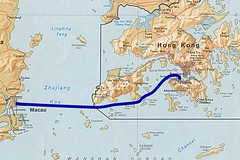Quick visit to Macau
As we skimmed effortlessly across the surface of the Pearl River delta on the hydrofoil ferry from Hong Kong to Macau, we gave up trying to see anything out of the salt-encrusted windows and turned our attention to the screens in the cabin which were showing an episode of Planet's Funniest Animals. It's amazing how often this show crops up. It seems to have been successfully franchised to every transport operator in the world. After the fifty minute journey we sped under one of Macau's inter-island bridges and docked. The place is an ex-Portuguese colony, and sure enough it immediately felt southern European: as we disembarked and entered the immigration hall we saw that it was packed with thousands of visitors, all languishing in a badly organised queuing system leading to the passport control booths, of which only half were open. It was a big contrast from Hong Kong's orderliness. And we came midweek when it's at its quietest!
Some facts about Macau
- Like Hong Kong, Macau is a Special Administrative Region (S.A.R.) of China. One implication of this is that is has a proper international frontier with the Chinese mainland and sets its own visa policy. Just like in Hong Kong, we were visa-free.
- The name Macau comes from Ama, the goddess of the sea and gao, the Portuguese for 'port'. Over time Amagao became Magao, then Macao/Macau. So it has the same name as Margao in Goa, India, which is where the train from Mumbai dropped us off 66 days ago.
- In 1847 the Portuguese legalised gambling in Macau and the industry has grown to the point where Macau's gambling industry turns over more per year than the one in Las Vegas.
- Back in the 1980s the Portuguese offered to hand Macau back to China, but China refused to accept it. Macau only returned to the Motherland when Britain did a deal on returning Hong Kong.
- Macau is small. The territory's main peninsula, not counting the islands of Taipa and Coloane, is smaller than Hong Kong's new airport: 8.7 km2 (2150 acres) versus 12.48 km2 (3083 acres)!
- Macau has yet another different currency, the pataca. One pataca is worth almost exactly the same as one Hong Kong dollar. Dollars and patacas are both legal tender in Macau, but you can only use dollars in Hong Kong.
Facts aside it's difficult to sum up Macau. The word 'weird' would definitely feature in our description. Certainly Macau is a place best seen by night when the monstrous carbuncle-like gold-coloured fun palaces metamorphose into monstrous carbuncle-like neon-clad fun palaces. By night it is harder to see the newly-cast-in-concrete attractions on the harbourside, comprising a volcano, a fort and a 'Roman amphitheatre'. This is a good thing. By the way, we learned in Turkey that an amphitheatre is a full circle or oval (i.e. a double theatre). This one is a semicircle and is therefore a theatre, not an amphitheatre. We would have pointed this out to anybody who might have listened, but we didn't know the Cantonese for "sorry to be pedantic, but…"
In the casinos, we stuck to the time-honoured advice of "only risk what you can afford to lose", and didn't risk anything. By day we walked round the Grand Prix circuit, which in many ways is better than Monaco's, visited a couple of museums and tried the Macanese cuisine—Portuguese-Cantonese fusion food that puts, for example, fried rice with salt cod. It tastes better than it sounds! We also took a cable car to the top of the Macau peninsula's only hill to see the Guia Fort and lighthouse.
A couple of days in Macau is plenty to see its sights unless you're in the market for some serious gambling. We're heading back to Hong Kong again this afternoon, to pick up our train tickets to Shanghai and sort out the final arrangements for the next three weeks in China.
Day 116
Hong Kong to Macau
This map shows the route we took in this post. Click it to see larger maps of our whole route at flickr.
Maps are taken from the CIA World Factbook.

![[IMG_1626]](http://farm1.static.flickr.com/168/432422054_143968fc12_m.jpg)




1 Comment:
Great post!
Macau is such a wonderful place. Like they say in Portuguese, “não há outra mais leal” (there is no other more loyal).
Helder Fraguas
Post a Comment